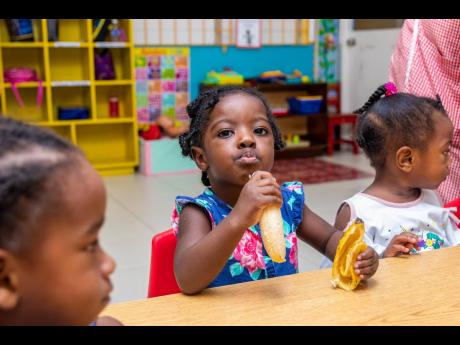Mariko Kagoshima | A national school nutrition policy is needed urgently
As Jamaican children and adolescents return to school physically after two years of online learning, their health and safety are a priority for all – parents, caregivers, teachers, school administrators, government, and the private sector. Steps have been taken by all these stakeholders to help ensure their safe return to face-to-face classes through protocols for mask wearing, social distancing, handwashing,and sanitisation.
To support improved learning outcomes, however, our children need safer school environments that protect all aspects of their health. Significantly, this includes their nutrition. COVID-19 has exacerbated nutrition and health challenges that existed for decades before its onset. Low levels of physical activity and consumption of large amounts of ultra-processed foods high in sugar, unhealthy fats and salt, along with limited fruits and vegetables, have been driving up overweight/obesity and non-communicable diseases (NCDs) in children, adolescents, and adults in Jamaica. According to the Global School -Based Student Health Surveys in 2010 and 2017, over the past decade, the rate of obesity doubled among adolescent boys and increased by almost 50 per cent in adolescent girls aged 13-17.
Sadly, as the pandemic unfolded, it became clear that people who contract the virus and who are also living with obesity or NCDs are at higher risk of serious illness and even death. At the same time, children’s eating habits have been negatively affected by the virus. A study conducted in 2020 by UNICEF and the Caribbean Policy Research Institute (CAPRI) on the socioeconomic impact of COVID-19 found that most households reported increases in children’s level of overeating (57 per cent). UNICEF’s Situational Analysis of Children 2021 noted that the combination of household income loss and the suspension of the school- feeding programme due to COVID-19 may lead to increased risk of malnutrition and consumption of cheaper processed foods with higher fat and sugar content.
SHAPE EATING HABITS
The food environment in and around schools influences our children’s food choices and helps shape their eating habits. The return to school, therefore, is an opportunity to create an environment that helps them realise their right to healthy foods and good health. Unfortunately, the current Jamaican school food environment requires much improvement to support healthy diets and physical activity and to protect children from the marketing of unhealthy food. Recent preliminary data from the JAMBAR (Jamaica and Barbados) Kids School Study, led by the Caribbean Institute for Health Research, showed a proliferation of unhealthy foods and pervasive marketing of these foods in our schools.
Encouragingly, the Government of Jamaica made bold strides in 2019 with the implementation of the Interim Guidelines for Beverages in Schools. These guidelines restrict the sale of sweetened beverages that are more than set sugar content limits. This should have been followed by the completion of the National School Nutrition Policy and supporting Standards by the 2019-2020 school year. School nutrition policies can support good health and educational outcomes by ensuring adequate and equal access to healthy food for all students.
SEEMS TO HAVE HALTED
UNICEF is concerned that Jamaica’s progress in this area seems to have halted. Schools have reopened for face-to-face learning, but the National School Nutrition Policy has not been finalised, putting our children’s health and well-being at further risk.
Unhealthy diets that are lacking in nutrients, vitamins, and minerals that children need to develop and thrive put them at risk for poor mental and physical health and poor educational outcomes, with longer-term impacts on obesity and NCDs in later life. These major threats should motivate us to finalise the Nutrition Policy and work together as a society towards its implementation to protect our children.
In a 2019 Rapid Assessment of the School Nutrition Policy Environment in the region, the Healthy Caribbean Coalition highlighted Jamaica as one of the few Caribbean countries demonstrating medium political commitment to introducing school nutrition policies. Significant and commendable work has already been done by our Ministries of Education and Health via efforts to restrict the consumption of sugary drinks in schools and to produce a draft School Nutrition Policy.
Jamaica now has an opportunity to advance these efforts, to move beyond “medium” commitment, and to lead in the Caribbean by taking decisive action to prioritise our children and protect their health and well-being. Let’s move forward together towards finalisation and implementation of the National School Nutrition Policy and supporting Standards for the 2022-2023 academic year as we look towards recovery, resilience, building back, and improving systems to help our children realise their rights to good health and a good education.
- Mariko Kagoshima is the country representative of UNICEF Jamaica. Send feedback to kingston@unicef.org.



